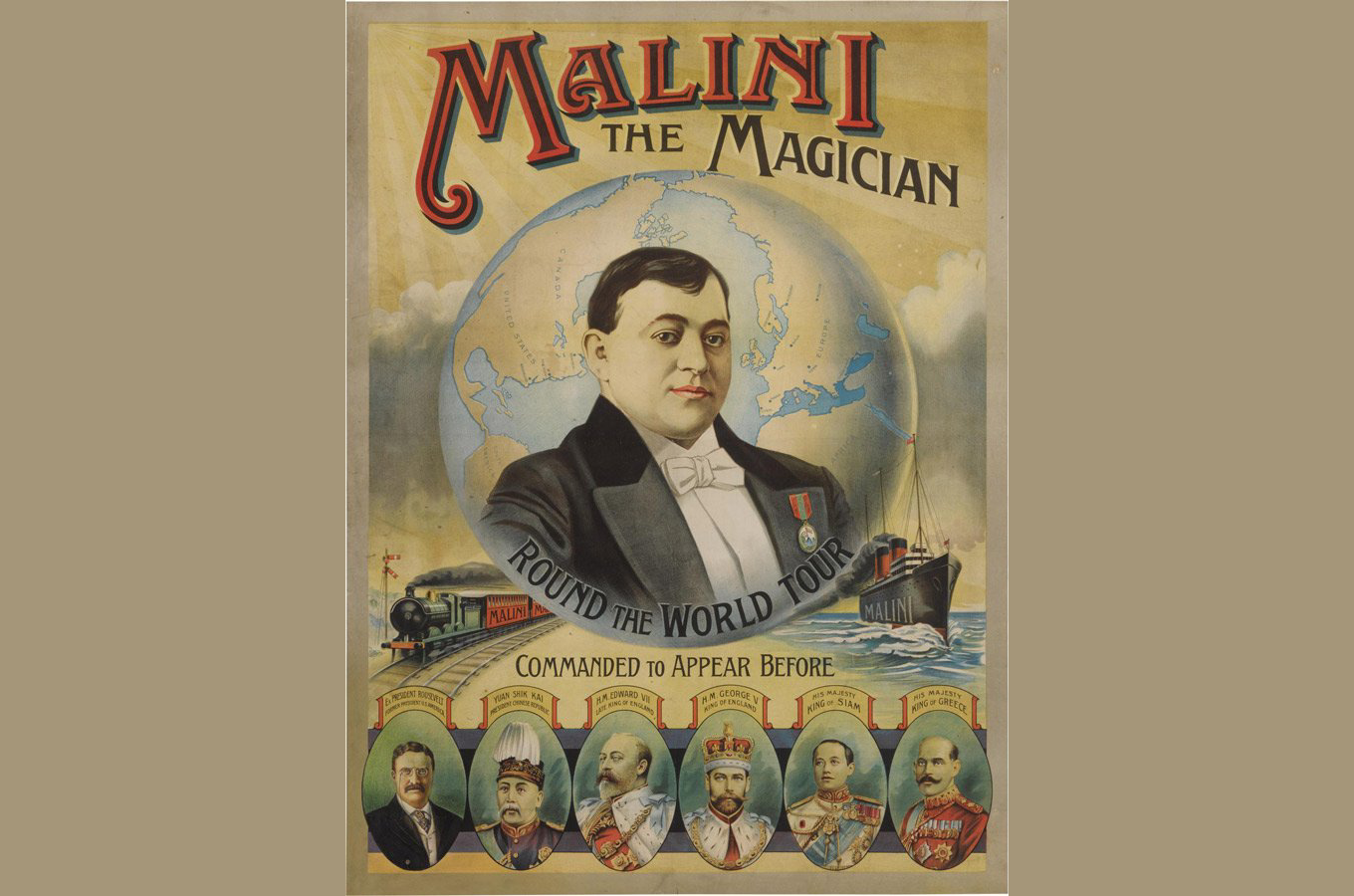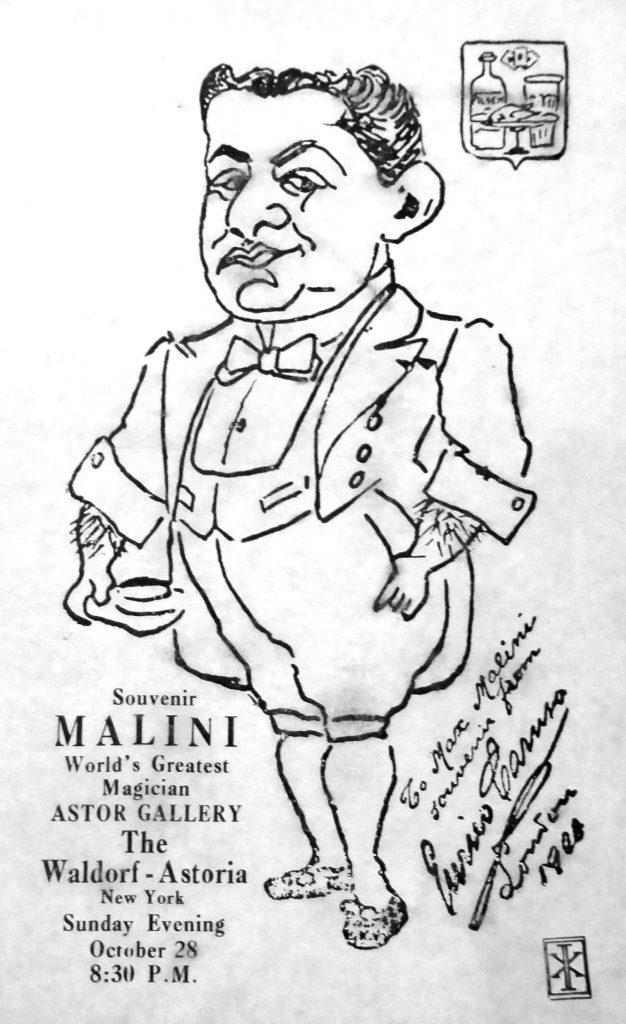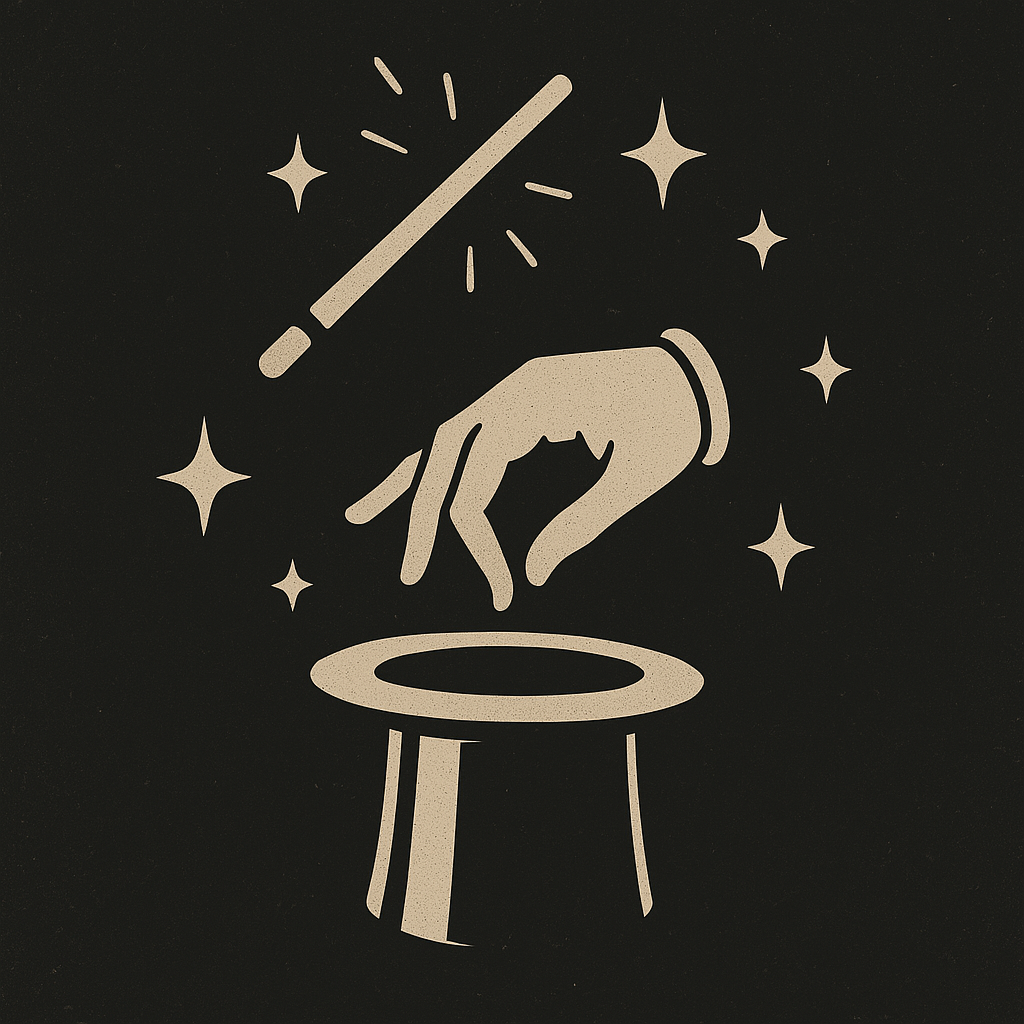The Impossible Magician

ANDREW MEETS MAX MALINI
Setting: A velvet-curtained parlor suite in the Waldorf Astoria, New York City. The year is 1933. The magician Max Malini is in his element—aging, flamboyant, unpredictable—and the interviewer has managed to slip in, notebook in hand, as if conjured by invitation.
Why now? Malini is nearing the end of his career. He’s still bold, but the glint in his eye has mellowed into mischief. This is a magician who fooled Roosevelt, kissed rings off fingers, and made entire blocks of ice appear in hats. We meet him at a reflective, dangerous point—where the ego of legend begins to reconcile with its own vanishing act.
Is it true you bit a button off the Kaiser’s cuff?
“I not only bit it off, my friend—I swallowed it. Let them say what they want about European etiquette, but none of them forgot me. That’s the trick. Memory. Not illusion. When a man swallows a button in front of an emperor, he becomes unforgettable. I traded politeness for permanence.”
That’s a dramatic way to be remembered.
“The world doesn’t remember polite men. It remembers rascals. The ones who dare. I’d perform a miracle, then disappear like smoke. Leave them asking: How? Who was that? Was he even real? That’s what I wanted—to become more legend than man. A good trick fades, but a good myth lives forever.”
Did you ever fear being caught or exposed?
“Never. You see, I didn’t sell tricks. I sold confidence. If I walk up to you and say, “Give me your hat,” and you do it—I’ve already won. The trick is just a bonus. People think the magic is in the sleight-of-hand, but it’s in the way you make them comply. It’s in the moment they surrender to wonder.”
You were famous for boldness. Lifting someone’s watch, palming an ice block—where did that bravado come from?
“I grew up poor. Real poor. Odessa. Immigrants. If you want to be noticed in this world when you have nothing—you have to make something. A gesture. A laugh. A gasp. Magic was survival. Then it became theatre. Then it became power. I learned to turn invisibility into spectacle. That’s where bravado is born.”
How did you transition from street corners to the White House?
“Luck! But not the kind you wait for. The kind you create. I snuck into parties. I made up titles. I was ‘The Great Malini’ before I was even good. You make a crown out of string and act like it’s gold—people believe you’re royalty. I invented my legend and then convinced the world it was fact. That’s how it works.”
So you faked your reputation?
“Faked? My dear boy, I constructed it. Like a carpenter with charm and glue. I was never the best sleight-of-hand artist. But I had presence. That’s rarer than technique. Technique impresses magicians. Presence enchants presidents. If people feel something around you, they’ll forget to ask how you did it.”
What’s the secret to presence?
“Risk. Real, pulsing risk. When I leaned over and drank the mayor’s cocktail—then poured it back full again—every eye froze. I bet everything on that second. Not the trick. The moment. Presence is created in that breathless silence just before the reveal. The danger of failure is what gives magic its soul.”
And if it failed?
“Then I’d vanish. Or blame the waiter. But mostly—I made it work. I always had an exit. You can’t be bold unless you plan your escape in advance. A good magician hides the escape hatch behind a curtain of bravado. Failure is a risk, yes, but it’s also an opportunity to improvise the next illusion.”
Some say you were a con man as much as a magician.
“Con? Short for confidence. I gave people wonder. For ten minutes, they believed in the impossible. That’s more honest than bankers or politicians. I never left anyone poorer, only more amazed. I offered fantasy in a world full of grim facts. In that sense, I was the most ethical liar alive.”
What about the ethics of deception?
“If I take your ring and return it with your jaw hanging open, that’s not theft. That’s joy. I never stole. I borrowed astonishment and gave it back with interest. My kind of deception is a gift—a carefully wrapped puzzle. It tells you: the world can still surprise you, if you let it.”

You performed for presidents. Did any of them impress you?
“Roosevelt had steel in his spine. Harding laughed too easily. Taft had excellent hands for magic—soft, slow. I liked Roosevelt best. He wanted to believe. He had that glimmer in his eyes that said, ‘Show me something I can’t explain.’ That’s all I ever needed—one open door, one curious soul.”
Be honest, Max—what’s the most outrageous, high-stakes trick you’ve ever pulled off?
He doesn’t answer right away, just smooths his cuffs, eyes half-lidded like he’s rewinding a film only he can see. “Berlin. 1904. I’m invited to perform for the Kaiser himself—Wilhelm II, the man with the moustache and the temper. Surrounded by military men, medals everywhere, guards on every door. One wrong breath, and they’d shoot first, ask questions later.”
He leans in, voices low and gleeful.
“So I walk up to him, bold as brass, and I shake his hand. Just a handshake, your Majesty. Only… when I let go, his watch is gone. Heavy, gold, royal crest. And I smile. He glares. For a moment, no one moves. I swear the air froze. Then I reach behind his ear like I’m plucking a coin from a child—and there it is. His watch. Still ticking.”
Malini chuckles, like it’s all a game. “He said nothing. Just looked at me like he wasn’t sure whether to knight me or kill me. I bowed and left the stage alive. That was enough.”
Incredible Max. Do you think people today still want to believe?
“Less and less. They Google secrets. They debunk before they dream. Sad, really. We used to chase ghosts. Now we dissect them. People used to let mystery bloom. Now they dig it up by the roots. But there’s still a spark. You just have to dig deeper to find it.”
You wouldn’t like today’s world?
“It’s too fast. Too exposed. A magician thrives in shadows. But there are still stages—still quiet hands. You find the spaces between clicks and swipes, and there, my friend, the miracle can live. Even now, some boy is learning to palm a coin, hoping to see wonder light up a face.”
What do you think of today’s magicians?
“Technicians. Some brilliant. But where’s the character? Where’s the swagger? I used to slap a king on the back and say, ‘Pick a card.’ Try that on TikTok. They’re skilled, but they play too small. They’ve forgotten that magic is theatre, not just tricks. A camera can’t replace the breath of a room.”
If you were starting now, would you still become a magician?
“Of course. But I’d do it differently. Maybe become a mystery artist. Or a disappearing activist. The world needs secrets. I’d make them valuable again. I’d sell mystery the way others sell outrage. Wonder has a higher price these days. That makes it more precious, not less.”
You sound almost… melancholic.
“Maybe. Even a magician gets old. I fooled the world. But I can’t fool time. Still, I hope some young rascal with a pocket full of nerve reads this and says: ‘I can do that. I can dare.‘ That would be enough. If my audacity outlives me, then I haven’t truly disappeared.”
Last question. What’s your proudest moment?
“Easy. I made a U.S. Senator weep—weep—with a coin trick. He said it reminded him of his mother. That’s the real illusion: turning sleight of hand into meaning. Now that’s magic. Reaching past the trick and touching the soul is the only applause that ever mattered. That’s immortality.”
THE MAGIC PERSPECTIVE

Max Malini (1873–1942) was a legendary close-up magician whose daring performances and spontaneous flair left a lasting mark on the world of magic. Born in Ostrow, Austria-Hungary, he moved with his family to New York as a child. With little formal education, Malini turned to sleight-of-hand early, performing impromptu tricks in bars and hotel lobbies, often without props—just charm, nerve, and an eye for spectacle.
He became famous for audacious stunts, such as biting off President Theodore Roosevelt’s coat button and restoring it or producing a block of ice from a senator’s top hat. His signature trick involved making a live frog appear from a block of ice taken from a drink—an act both baffling and theatrical. Malini’s genius lay not only in his sleight-of-hand but in his psychological mastery, misdirection, and refusal to respect boundaries between performer and audience.
Unlike stage magicians of his day, Malini preferred private shows, hotel lounges, and uninvited encounters with the powerful and famous. He believed in creating amazement in real time with borrowed objects and up-close encounters. His audacity and unpredictability turned ordinary settings into theatres of astonishment.
Malini performed for kings, presidents, and celebrities, and inspired generations of magicians, including Dai Vernon. Though he died in 1942 in Honolulu, his legacy as the rogue king of close-up magic remains strong. His name still commands respect in magical circles as the embodiment of bold, unforgettable wonder.
I share a new Andrew Meets imaginary conversation with interesting historical figures each month. Who should I meet next? Suggest someone, and if I select this person, I’ll send you a free book and credit you at the end of the Conversation. Sign up for my occasional newsletter to hear of other developments of possible interest at this site and new books.
© ANDREW LEIGH 2025
